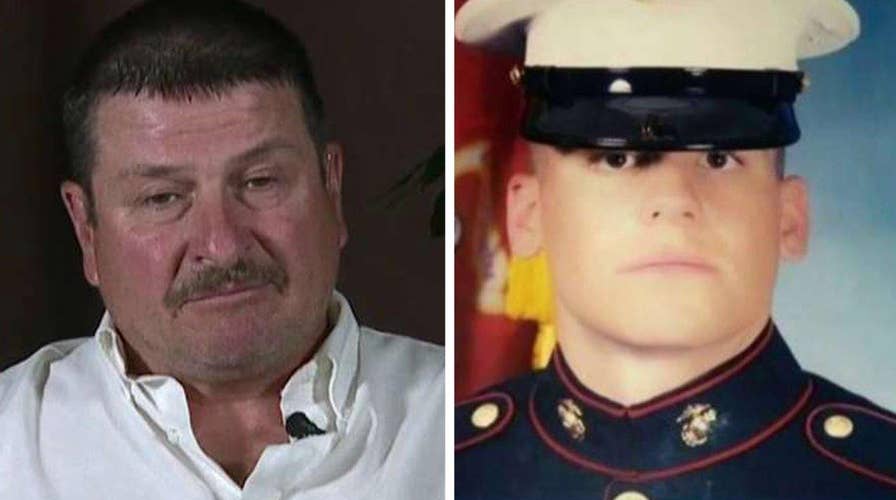Father who lost son to overdose at VA hospital speaks out
On 'Fox & Friends,' Marvin Simcakoski reacts to congressional report on Veterans Affairs painkiller abuse scandal
The last time he saw his son, Marvin Simcakoski suspected something was not right.
“He was slurry. It just wasn’t him,” his father said, describing how Jason, a 35-year-old Marine veteran, was lying down and holding his head when he visited him at the VA hospital that day in 2014.
But the nurses assured him they’d just given him medication, and he’d be better in a couple hours.
So Marvin left. Later, he got the phone call: His son had stopped breathing.
“It was probably the worst day of my life,” Simcakoski said.
Jason Simcakoski’s system was filled with a toxic mix of prescription drugs when he died. His father is among the family members of veterans now hoping for a major change in the way drugs are prescribed for veterans, after his son’s case and others’ were detailed Tuesday in an extensive and scathing Senate report that slammed officials at the Tomah Veterans Affairs Medical Center in Wisconsin.
The report blamed a “culture of fear” for “overprescription and other abuses” that allegedly ran rampant at the facility – where, on Aug. 30, 2014, Jason Simcakoski died – and called these tragedies “preventable.”
"This is a leadership failure," Sloan Gibson, deputy secretary of the VA, testified Tuesday at a field hearing of the Senate Homeland Security and Governmental Affairs Committee. "There's lots of finger pointing and everything else. At the end of the day, we own this. VA leadership owns this. We had ample opportunities over the years to fix this."
Simcakoski died of “mixed drug toxicity.” According to the Senate report, he was found with more than a dozen different drugs in his system. He died days after chief of staff Dr. David Houlihan approved adding another opiate to the 14 drugs he had already been prescribed.
Houlihan was nicknamed "candy man" by some patients.
After Simcakoski's death, the VA conducted its own investigation, which led to the firing of Houlihan and the medical center's director, Mario Desanctis.
The Senate report found inspector general investigators suspected Houlihan and nurse practitioner Deborah Frasher "appeared to be impaired" when they were interviewed in 2012, but no action was taken. Houlihan was fired in November 2015 after being on administrative leave for months. Frasher, who worked alongside Houlihan, resigned in February 2015.
Houlihan's attorney, Frank Doherty, disputed the report's findings. He said claims that Houlihan was impaired were "nonsense."
The report also singled out the VA's inspector general's office for "failure to identify and prevent the tragedies" at the Tomah center, including not publicly releasing findings from its probe that could have saved lives and improved operations.
Marvin Simcakoski, speaking Wednesday with Fox News, agreed that action could have been taken to save lives.
“[Jason] probably would have been alive today if things would have been done differently,” he said.
The focus now, he said, is to make sure what happened to Jason does not happen to others.
“The veterans need to send a message … that too much prescription drugs is not the answer to the problems that these veterans are facing,” he said.
Sen. Ron Johnson, R-Wis., chairman of the committee that investigated the matter, told Fox News that “people have been held accountable” in this case, but more needs to be done to give the VA vital disciplinary tools.
“It’s about holding the bad actors accountable and transparency,” he said.
Three deaths at the Tomah facility remain under investigation.
The Associated Press contributed to this report.





